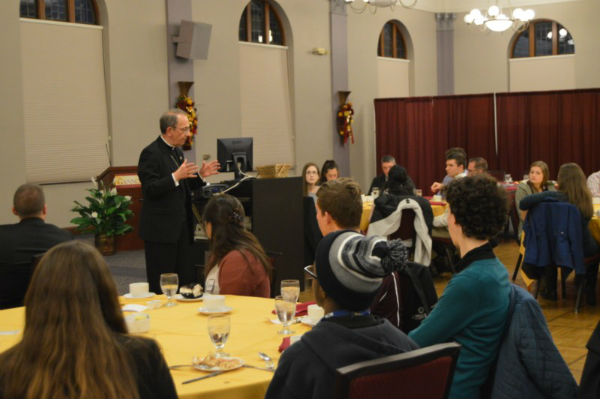
BISHOP PERSICO MEETS, TALKS WITH AREA COLLEGE STUDENTS
Erica Erwin
10/28/2018

Bishop Lawrence Persico told a group of college students that they should intentionally live their faith if they want to help their friends and peers regain trust in the Catholic Church.
“You just can’t say, ‘Trust me, let’s go to church,” Bishop Persico told a group of about 60 college students and campus ministers during an annual “Dinner and Discussion with the Bishop” event at Gannon University on Friday. “There has to be a reason for people to trust you and to trust the church.
“Obviously since you’re here, you’re faith-filled. If you weren’t, you wouldn’t be sitting here on a Friday night,” he continued. “I think it’s safe to say you are men and women of faith, that you’re believers. If you live your faith in a way in which you demonstrate your relationship with Jesus Christ, you will give witness to your faith. If they see your example, that would be a good example of how you can lead someone back to the faith.”
Students and campus ministers from Gannon, Mercyhurst University, Mercyhurst North East, Allegheny College, Penn State Behrend, Edinboro University and Clarion University attended the gathering in Gannon’s Yehl Ballroom. Discussion centered around the grand jury investigation into clergy abuse in six of the state’s eight Catholic dioceses, including the Diocese of Erie, and three main questions: In light of the Grand Jury Report, how do I trust the church? What role can we as college students play in helping our peers reestablish or maintain trust in the church? And how do we keep any distrust we may have in the church from leading us to distrust in God?
“It’s one of the few events where college students from many of the Catholic campus ministries have the chance to come together and interact with one another,” said Brent Heckman, Gannon’s director of campus ministry. “Secondly, students can interact with the bishop. They get a chance to see the character and personality of the bishop in a way they might not (otherwise) get to see.”
Bishop Persico fielded questions for more than 90 minutes. Rebuilding personal trust in the church and its religious leaders, and rebuilding the trust of others, is going to take time, he said, before outlining some of the processes and policies the diocese has implemented in response to the sexual abuse crisis.
“There’s no quick fix,” he said. “We Americans like to see things fixed within 24 hours. This is going to be with us for a long time and a lot of it is going to depend on the strength of our faith but, more importantly, our relationship with Jesus Christ to help us rise above.”
He then asked the group, roughly half of which had read the findings of the Grand Jury Report, what the Catholic Church needs to do moving forward.
“Transparency will help draw people back but new people to the church, too,” one student answered.
More dialogue, another suggested. “Encourage people to discuss problems and promote ideas,” she said.
In responding to a question about how the faithful can keep distrust in the church from becoming distrust in God, Bishop Persico drew a distinction between distrusting God and being angry at God for “allowing” the abuse to happen. Such anger is a very human emotion, he said, but the perpetrators made their own choices through free will.
“Not only is it sinful what these perpetrators did, but it is evil, too,” he said. “This is a perfect example of how evil has entered the community and led these perpetrators astray. It has nothing to do with God.” The criminal nature of child abuse led the church to establish clear national policies to handle perpetrators beginning in 2002.
One student asked how fellow Catholics can best help victims of sexual abuse.
Bishop Persico pointed to the diocese’s publication of the names of religious and lay people who have been credibly accused.
“When you shine a light on what has happened … some of that produces healing,” he said. “Another way is listening (to the victims). The worst thing we can say is, ‘Get over it.’ Bishop Persico has acknowledged that each victim has his or her own story, with unique pain and grief. In his statement the day the Grand Jury Report was released, he said he recognized that “apologizing is only one step in a very long and complex process of healing.”
-
